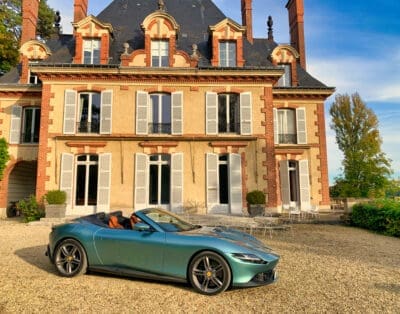British Horse Racing: Blandford Bloodstock Race Horse Ownership
Richard Brown, Managing Director of Newmarket-based Blandford Bloodstock, is widely recognised as one of the most talented bloodstock agents in the business. His career has seen him buying and selling some of the world’s greatest thoroughbred racehorses, including Dream Ahead, rated the equal-best two year old in Europe in 2010 and winner of numerous accolades including the Prix Morny, July Cup and the Prix de la Foret, and I’m A Dreamer, winner of numerous races including the Grade 1 Beverly D. Stakes in the US. Here, Richard speaks to us about the realities of investing in horses and how one can go about getting involved in racehorse ownership.
When it comes to racehorse ownership, different people have different aspirations. A lot of the time, people just want to see their horse win in their colours and then you can buy the right horse to help them try to achieve that goal as quickly as possible. Alternatively, the aim might be to buy a horse who will take them to all of the big meetings and let them rub shoulders with the rich and famous. Perhaps they might want to get a string of racehorses together and do the whole thing very seriously and try to compete right at the top. It is the job of the bloodstock agent to match the right horses with the right owner.
There are a number of ways through which people become involved in racing, but it is frequently with the help of a friend with an existing interest in the sport. Alternatively, anyone can make contact with a local trainer or bloodstock agent or look at the new Great British Racing website Inthepaddock.co.uk, which is a useful resource for anyone interested in ownership. Racing can seem like a bit of a closed shop from the outside, but you will find as soon as you take the first step, that racing people are very passionate about their sport and cannot wait to help you become involved too.
A bloodstock agent is someone involved in purchasing and managing all aspects of bloodstock, looking after trainers, breeders and owners. It is our job when someone comes into the game to try to align their interests with the right kind of horse and the right kind of trainer. It is important to be honest though. When I get a new client, the first thing I will say is ‘You’re almost certainly not coming into the sport the make money.’ There are amazing stories of owners who buy only one horse, get lucky and make huge amounts of money. However, if one is talking about the word ‘investment’ as simply meaning a way to make a profit, then racing almost certainly is not for you.
Most of the horses I buy come from auction. British Flat racing has sales seasons in the spring and the autumn. In the spring, we have something called Breeze-up Sales for two-year-olds where they gallop for a couple of furlongs before being sold. Those sort of horses are often popular for owners looking to get going quickly because they can be ready to race just 4-6 weeks after the sale. At the autumn sales in September and October, we are buying yearlings – horses who are one year old and who won’t be racing at least until the following year. Often, you have to go to three or four sales or more to find the right horse for the right owner at the right price.
Anybody can go to a racehorse sale and they are fascinating places – the same as going to Sotheby’s or Christie’s. Auction houses can be thrilling and if you are planning to buy a horse at auction it’s not a bad idea to go along first, have a dry run and get a feel for it. It is high-octane stuff and you can easily become carried away – although that is another job of the bloodstock agent to try and stay within the parameters set. What I often do with clients is ask them to come a few hours before the sale and we’ll see maybe up to a half a dozen horses that I have selected to suit them, and then they’ll come into the sales ring for the bidding process too.
You can rarely say ‘This is the day on which we will buy your horse’ as it simply doesn’t work like that. But if the client is with you, and they want to bid, then they will do. At the end of the day, it is their money. However, more often than not we are talking to our clients on the end of the phone, or working to an agreed budget. It is what we do every day and that enables us to take the emotion out of it. A new owner might see the horse of their dreams, let the emotion get to them and overspend which is never an ideal way to start ownership. The agent often has an important role to play in simply keeping things on track.
There are a number of factors involved when buying a horse and breeding is undoubtedly important. We are looking at the sire (father) and dam (mother) and their families, doing a great deal of research and using that information to give us a fair idea of both the sort of qualities that a horse might have the distance over which it might be most effective. Another thing an agent will consider is where the horses are coming from. There are good farms who consistently supply good horses, so you get to know them. Arguably, the biggest piece of the jigsaw is simply to look at the individual as a physical specimen. You are trying to piece together lots of different things to give you an idea as to which horse might be an athlete.
There is absolutely no need to be an expert to be involved in racehorse ownership – the experts are the people you employ. If you are going to use a bloodstock agent, or a go straight to a trainer, they are the expert. In fact, I must admit that I love it when someone comes to me who is new to the sport because they are often keen to learn and I see it as being part of my role to educate them about racing. You employ experts to try and stack the odds as much in your favour as possible.
Rather than buying 100% of a horse and being responsible for all of its costs, one of the best ways of getting involved is with a syndicate. There are syndicates and partnerships out there where you can own as little as 1/2000th of a horse, but others where, for example, you can own a one-tenth share of three or four horses. That is simply spreading your risk and common sense when you are still finding your way in the sport. In some syndicates, you just pay one fee up front and most syndicates will be very up front about finances and return any prize money or profits in a dividend to shareholders.
British racing is the best in the world and the foreign markets for British racing are very strong – they love buying our horses. I went out last year and bought seven horses at the Breeze-Up sales in the spring for a syndicate I’d set up. We have sold two so far, including one that we bought for £30,000 and sold for £270,000. Another has twice won impressively and is a possible runner in the QIPCO 2000 Guineas at Newmarket, one of the most famous races in the world. Some said I was crazy but it looks like we are going to make a nice profit. In doing so, we have had to leave some of the fun behind – you have to sell the horses at the right price when the offers are there and sacrifice living the dream. For others, of course, it is the dream of owning the next Frankel that is what racehorse ownership is all about.
To explore the world of racehorse ownership and to find out where best to start, visit www.Inthepaddock.co.uk.







